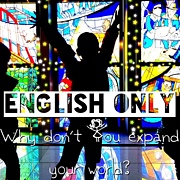I've had this thing for a while, whenever I met anyone from a different country, I'd try to ask them how to say "hello" or "thank-you" in their language.
People from my network responded pretty well to this so I figured I'd try it out with the English Only community as well. There's got to be loads of people out there who know other languages, so if you're a generous sort of person, please add whatever new greetings and thank-you's you like.
Here's my collection so far (that I can remember off the top of my head), plus additions from all my mixi pals. (Thanks guys!) I've sounded out the words in English phonetics as closely as I can remember (pardon if the spelling is way off):
1. Japanese: konnichiwa, arigatou (of course)
2. Chinese (Mandarin/Beijing dialect): nihao(ma) [knee-how-mah]; xie-xie [sheh-sheh]
3. Chinese (Cantonese/Hong Kong dialect): nehou(ma) [nay-houh-mah]; dou-jie [douh-jeh],
吾(hmm)該(goi) = thanks! (when being served) or excuse me
4. Spanish: buenos diaz, gracias (grashias)
5. Portugues: bom dia (bom jia), obrigado
6. Italian: bonjourno, grazie (grratzi)
7. French: bonjour, merci
8. Hawaiian: aloha, mahalo
9. Russian: dobreden, spastiva
10. German: guten Tag, danke shon (dankeshen - Austria)
11. Swiss-German: grüetzi, merci (or Danke schön)
12. Korean: annyon hasseo, kamsahmnida
13. Polish: jindobre, jinkuyeh
14. Mongolian: sainbainuu, (can't remember thank-you)
15. Persian (Farsi): ruzatun dagherra but I've heard it's more commonly salaam, (don't know thanks in Persian)
16. Arabic: As-Salaam Alaikom (literally; "peace be with you"); shoukran
17. Kenyan: hakuna matata, (can't remember thanks)
18. Thai: sawadhi-ka (for women)/sawadhi-krahp (for men), kop(k)un-ka (for women)/kop(k)un-krahp (for men)
19. Turkish: merhaba, teşekkürler/teşekkür ederim
20. Philipino: magandang hapon(=good afternoon), salamat sa iyo
21. Tanzania: jambo, asante
I'd still like to learn more. If you have any greetings and thank-you's not on the list could you pass it on to this thread? If you have another greeting and thank-you please post it in as close to the phonetic sound as possible and add the actual or common spelling if you have it. Any corrections to mistakes I've made are also very welcome.
People from my network responded pretty well to this so I figured I'd try it out with the English Only community as well. There's got to be loads of people out there who know other languages, so if you're a generous sort of person, please add whatever new greetings and thank-you's you like.
Here's my collection so far (that I can remember off the top of my head), plus additions from all my mixi pals. (Thanks guys!) I've sounded out the words in English phonetics as closely as I can remember (pardon if the spelling is way off):
1. Japanese: konnichiwa, arigatou (of course)
2. Chinese (Mandarin/Beijing dialect): nihao(ma) [knee-how-mah]; xie-xie [sheh-sheh]
3. Chinese (Cantonese/Hong Kong dialect): nehou(ma) [nay-houh-mah]; dou-jie [douh-jeh],
吾(hmm)該(goi) = thanks! (when being served) or excuse me
4. Spanish: buenos diaz, gracias (grashias)
5. Portugues: bom dia (bom jia), obrigado
6. Italian: bonjourno, grazie (grratzi)
7. French: bonjour, merci
8. Hawaiian: aloha, mahalo
9. Russian: dobreden, spastiva
10. German: guten Tag, danke shon (dankeshen - Austria)
11. Swiss-German: grüetzi, merci (or Danke schön)
12. Korean: annyon hasseo, kamsahmnida
13. Polish: jindobre, jinkuyeh
14. Mongolian: sainbainuu, (can't remember thank-you)
15. Persian (Farsi): ruzatun dagherra but I've heard it's more commonly salaam, (don't know thanks in Persian)
16. Arabic: As-Salaam Alaikom (literally; "peace be with you"); shoukran
17. Kenyan: hakuna matata, (can't remember thanks)
18. Thai: sawadhi-ka (for women)/sawadhi-krahp (for men), kop(k)un-ka (for women)/kop(k)un-krahp (for men)
19. Turkish: merhaba, teşekkürler/teşekkür ederim
20. Philipino: magandang hapon(=good afternoon), salamat sa iyo
21. Tanzania: jambo, asante
I'd still like to learn more. If you have any greetings and thank-you's not on the list could you pass it on to this thread? If you have another greeting and thank-you please post it in as close to the phonetic sound as possible and add the actual or common spelling if you have it. Any corrections to mistakes I've made are also very welcome.
|
|
|
|
コメント(70)
!Holla! everyone, I haven't looked on this thread too much lately since it got buried by a host of other topics. I think if there is a problem with continuity, it's because it's hard to tell if certain languages have been covered or not. I might have to bring everything in and repost again for a fresh start. Thanks to everyone for the contributions, corrections and additional variations in the same languages. It's been enlightening.
>>>Hari
I have to RE-correct you...
It spells "hola"...(Spanish people would pronounce "holla" like"oya", "olya" or "oja" though there's no such a word)
>>>Guchi
"buenos días" is correct form to say "Good morning".
and "gracias" sounds more like"grathias" in Spanish though it is really a subtle mistake...
I have to RE-correct you...
It spells "hola"...(Spanish people would pronounce "holla" like"oya", "olya" or "oja" though there's no such a word)
>>>Guchi
"buenos días" is correct form to say "Good morning".
and "gracias" sounds more like"grathias" in Spanish though it is really a subtle mistake...
ひぐっさん,
Yeah, the different ways people pronounce "ll/y" sometimes puzzled me. I first took Spanish in university in Tokyo. The teacher was a Catholic sister from Spain. She pronounced "ll/y" like the Japanese "j," so "Yo lo se" was "ジョ・ロ・セ." Then I came to the U.S. and made friends with a guy from Mexico. He said it like "ヨ・ロ・セ."
Yeah, the different ways people pronounce "ll/y" sometimes puzzled me. I first took Spanish in university in Tokyo. The teacher was a Catholic sister from Spain. She pronounced "ll/y" like the Japanese "j," so "Yo lo se" was "ジョ・ロ・セ." Then I came to the U.S. and made friends with a guy from Mexico. He said it like "ヨ・ロ・セ."
Wow, thanks for all the latest info everyone!
Especially all the stuff on latin-based languages and Spanish variations.
Pedro> I knew about the "good day" translations for the latin language greetings, but wasn't certain about there being a literal translation for "hello". Thanks for the additions. So in French and Spanish they also say "salut!" when toasting with drinks.. are they literally just saying "hello?"
だいはど> I was always confused about the conflicting "y" and "j" sounds I heard in Spanish. I guess regions will quickly alter the common pronunciation over time eh?
Sergio> Is there a country you haven't been to yet!? :)
Especially all the stuff on latin-based languages and Spanish variations.
Pedro> I knew about the "good day" translations for the latin language greetings, but wasn't certain about there being a literal translation for "hello". Thanks for the additions. So in French and Spanish they also say "salut!" when toasting with drinks.. are they literally just saying "hello?"
だいはど> I was always confused about the conflicting "y" and "j" sounds I heard in Spanish. I guess regions will quickly alter the common pronunciation over time eh?
Sergio> Is there a country you haven't been to yet!? :)
Thanks for clearing that one up Pedro. I'd heard "salut" or "salude" or variations therof from so many people that I know I was getting confused about literal and applied meanings.
I really like that I'm seeing languages and dialects that I've never even heard of before presented. Thanks 3mi-san for the Kadazan greeting and thank-you.
I really like that I'm seeing languages and dialects that I've never even heard of before presented. Thanks 3mi-san for the Kadazan greeting and thank-you.
だいはど> I don't think that I've heard Greek yet. Thanks for the add. Now I gotta figure out where the emphasis and accents are in the pronunciations. Another time though. At least I have a point to start from now.
mappyman> I thought "No worries" was the way you greeted each other in Kenya. I could be wrong though. My memory often fails me when I have to dig too far back.
mappyman> I thought "No worries" was the way you greeted each other in Kenya. I could be wrong though. My memory often fails me when I have to dig too far back.
A couple of nitpicks.
4. Spanish: buenos diaz, gracias (grashias)
Buenos días <-
Buenos di'as (for those with mojibake font trouble)
, is actually a valid way to express "konnichiwa" in certain contexts. "Hola" is also good, as mentioned above.
"Gracias" is pronounced differently in Spain, where 'ci' is pronounced almost like English "thi" as in "thin"
"Castellano" is a useful word for us Spaniards. In one of it's meanings, it's "the" Spanish language - as opposed to other Spanish languages. Note that there are several languages currently spoken in Spain, four of them official: Basque, Catalan (Catalonian), Galician and Castillian and their corresponding dialects. In this context, "Spanish" doesn't sound appropriate to us. There are also other languages currently not spoken by enough people to be official, but they do exist and they're also Spanish.
Another use for "Castellano" is as a discriminator for the Spanish dialect spoken in Castille from other "Castillian-speaking" regions inside Spain or Spanish-speaking countries. This is the concept argentinians can't seem to grasp :P their dialect is definitely not "correct" or "standard" Castillian. In their case, "Espan~ol" (Español) would be more appropriate. I don't know, this could be an issue of nationalism, as in "we're not spanish." Not a biggie anyway.
In Spain there are places where "ll" and "y" are different. Same for "b" and "v" - but this distinction is not enforced and it's also considered proper Spanish to pronounce them the same.
- Francisco Xavier was from Navarra, not from the Basque Country. He probably could speak some Basque as it wasn't uncommon there. About 25% of the people in the Basque Country speak Basque as first language. In Navarra it's more like 10%. Most natives of both regions do understand Basque.
Sorry for the boring post :P
That said, I'll add some Spanish :D
-Basque:
Egun on (Buenos días) pronounced "Egún on"
Kaixo (Hola) pronounced "Káixo"
Eskerrak (Gracias) pronounced "Eskérrak"
Eskerrik asko (Muchas gracias) pronounced "Eskérrik Askó" -> thank you very much
-Catalan:
Bon dia (Buenos días)
Hola (Hola)
Grácies (Gracias)
Moltes Grácies (Muchas gracias)
4. Spanish: buenos diaz, gracias (grashias)
Buenos días <-
Buenos di'as (for those with mojibake font trouble)
, is actually a valid way to express "konnichiwa" in certain contexts. "Hola" is also good, as mentioned above.
"Gracias" is pronounced differently in Spain, where 'ci' is pronounced almost like English "thi" as in "thin"
"Castellano" is a useful word for us Spaniards. In one of it's meanings, it's "the" Spanish language - as opposed to other Spanish languages. Note that there are several languages currently spoken in Spain, four of them official: Basque, Catalan (Catalonian), Galician and Castillian and their corresponding dialects. In this context, "Spanish" doesn't sound appropriate to us. There are also other languages currently not spoken by enough people to be official, but they do exist and they're also Spanish.
Another use for "Castellano" is as a discriminator for the Spanish dialect spoken in Castille from other "Castillian-speaking" regions inside Spain or Spanish-speaking countries. This is the concept argentinians can't seem to grasp :P their dialect is definitely not "correct" or "standard" Castillian. In their case, "Espan~ol" (Español) would be more appropriate. I don't know, this could be an issue of nationalism, as in "we're not spanish." Not a biggie anyway.
In Spain there are places where "ll" and "y" are different. Same for "b" and "v" - but this distinction is not enforced and it's also considered proper Spanish to pronounce them the same.
- Francisco Xavier was from Navarra, not from the Basque Country. He probably could speak some Basque as it wasn't uncommon there. About 25% of the people in the Basque Country speak Basque as first language. In Navarra it's more like 10%. Most natives of both regions do understand Basque.
Sorry for the boring post :P
That said, I'll add some Spanish :D
-Basque:
Egun on (Buenos días) pronounced "Egún on"
Kaixo (Hola) pronounced "Káixo"
Eskerrak (Gracias) pronounced "Eskérrak"
Eskerrik asko (Muchas gracias) pronounced "Eskérrik Askó" -> thank you very much
-Catalan:
Bon dia (Buenos días)
Hola (Hola)
Grácies (Gracias)
Moltes Grácies (Muchas gracias)
I have some friends from Iceland.
When I went to Iceland and hung out with one of them,
she always greeted like "hello" to local people...
(Probably it is spelled a different way)
I know thank you in Icelandic.That's "takk".
(pronounced almost same as in other nordic languages)
And, this word is the title of an album of this famous band "Sigur Ros" from Iceland.
When I went to Iceland and hung out with one of them,
she always greeted like "hello" to local people...
(Probably it is spelled a different way)
I know thank you in Icelandic.That's "takk".
(pronounced almost same as in other nordic languages)
And, this word is the title of an album of this famous band "Sigur Ros" from Iceland.
- mixiユーザー
- ログインしてコメントしよう!
|
|
|
|
☆ENGLISH ONLY☆ 更新情報
-
最新のアンケート
☆ENGLISH ONLY☆のメンバーはこんなコミュニティにも参加しています
人気コミュニティランキング
- 1位
- 大人のmixi【おとミク】
- 6470人
- 2位
- 食べ物写真をつい撮ってしまう人
- 19248人
- 3位
- 写真を撮るのが好き
- 208304人
























